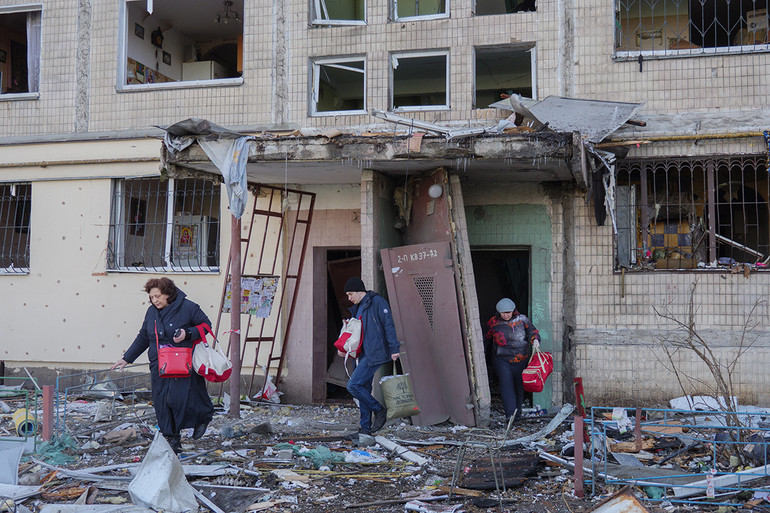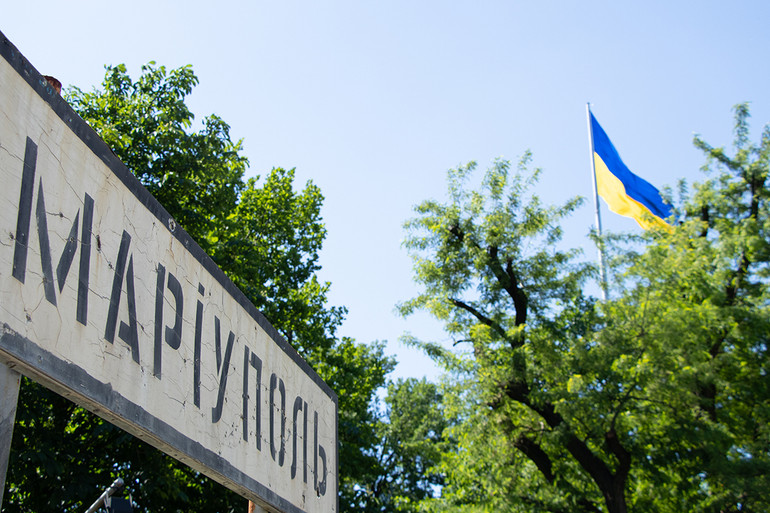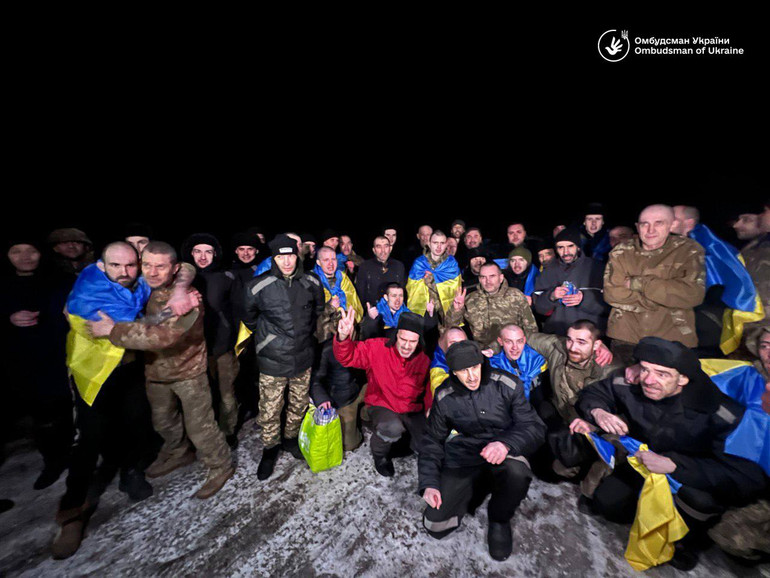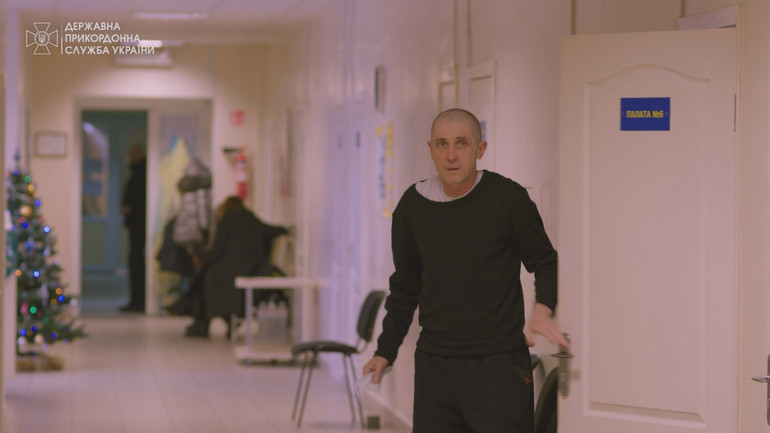He escaped from captivity three times. The story of a border guard who defended Mariupol
[ad_1]
52-year-old border guard Oleksiy Bilousov escaped from captivity three times in occupied Mariupol. Two attempts were successful, but the third was not. He was captured by a patrol of the so-called “DPR” in mid-April 2022.
He has been serving in the military since 2018, but “got to know” the occupiers back in 2014, when they captured his native Debaltseve.
Oleksiy was in captivity for almost two years – he was exchanged on January 3, 2024. But, as he noted, there was no “wild joy” – its place was taken by fatigue, cold and exhaustion.
“UP.Zhyttia” spoke with Oleksiy Bilousov about service, capture and exchange.
The start of a full-scale invasion was met at the service
In 2014, Oleksiy “met” the Russians when they invaded his native town in Donetsk region. They occupied Debaltseve for several weeks, until Ukrainian troops regained control of the village.
Then Oleksiy’s family left to stay with relatives in Boryspil, but when they wanted to return in the summer of 2014, they came under the “hail” of the Russians and changed their minds. The family of the future border guard left the house and moved to the Zaporizhzhia region.
I had to start life from scratch. At first, the family lived with relatives, later they bought a house for which there were enough funds. At that time, Oleksiy was working in Poland, in his free time he was engaged in grants for immigrants. But it did not bring the desired earnings, so in 2018 he signed a contract with the Armed Forces.
The duty of a military man was 4-day service at observation posts in Donetsk region. After the end of the contract, he extended it for another term.
Oleksiy served as a border guard
Depositphotos
“That’s how the war ended – on duty. I was in Melekin, it’s 20 kilometers from Mariupol. At dawn on the 24th of 2022, the FSB boats, which were usually at a distance of 8-15 km from the shore, disappeared.
I heard on the international communication channel: “I am a Russian warship…”. But it was not visible even on the monitor.” – recalls the military man.
Oleksiy was ordered to take all the equipment and leave Mariupol. But when the soldiers of the border detachment reached the Dnipro, they received another order – to turn back.
On the night of February 27, they drove into the city, which was stormed by the Russians with all types of weapons.
Blockade Mariupol
Oleksii’s wife and their three children were in a village in Zaporozhye at that time. They did not manage to leave immediately.
A woman with three children and her mother reached the controlled territory on April 4. She drove 200 km to Zaporizhzhia for 18 hours – there were many roadblocks on the way.
“They traveled without belongings, because the Russians did not release those who wanted to leave permanently. That’s why the wife said that they were visiting. She burned the documents and clothes. She hid or buried some things, because if the occupiers had calculated that she was the wife of a border guard, the story would have been different.”the man says.
Communication in the besieged Mariupol disappeared almost immediately – since March 3 it was impossible to call anyone. But at the headquarters, military personnel were given 10 minutes to communicate with their relatives before going on a mission. So Oleksiy received a message from his wife and “breathed his last”, because his relatives were in relative safety.
Fierce battles took place in Mariupol.
“I had to go to apartments in high-rise buildings to monitor enemy equipment. People, of course, were indignant that they were being fired at – supposedly because of us. There was a lot of negative and prejudiced attitude. But there was no time to tease them or persuade them – we had an order.” – says the soldier.
The occupiers “worked out” with tanks on the houses in order to dislodge the Ukrainian military.
Oleksiy notes that in Mariupol he felt how important language is. The military has special code words for communication so that the enemy does not understand what is being said. But the boys from Ivano-Frankivsk did not invent a cipher, but chatted in their own dialect. The Russians didn’t even have a chance to understand them.
But the enemy’s equipment burned neighborhoods – one after the other. There were fewer places for defense, the ring narrowed. The soldiers had to go to the factories – “Azovstal” and Ilyich. Oleksiy ended up on the last one.

Destroyed houses in Mariupol
Depositphotos
Attempts to get out of the environment
In April, chaos was felt in Mariupol. The Russians captured the entire city, with the exception of a few factories where Ukrainian soldiers were stationed. Many local residents had a pro-Russian position.
For example, a saleswoman in a store persuaded the soldiers “not to fool around” and surrender to the enemy. Oleksiy says that she described her stay with the Russians as heaven on earth. There, they say, they will feed you, give you tea, and definitely save your life.
“I knew from Debaltseve that you can’t trust the Russians. And capture is actually a sentence. So when I learned that some marines were going to surrender, I started looking for another way“, says the border guard.
One of the chiefs of the mobile outpost also did not share the enthusiasm about the capture. There were three soldiers with him: they wanted to go out in civilian clothes and without weapons. The plan was to get to Zaporozhye on foot, join the active units and continue the service.
Oleksiy wanted to go with them, and although the chief refused him, the soldier assured him that he would not become a burden and understood the complexity of the operation.

Mariupol was surrounded
Depositphotos
The first attempt to get out of the environment failed due to thick, like sour cream fog. On the night of April 12, not even the road leading out of the Ilyich plant was visible.
Therefore, Oleksiy with the commander and three soldiers tried again the next night. They got lost and found themselves outside the factory already at dusk.
The Russians had orders to shoot everyone without warning at night, so the military took a lot of risk.
It was not possible to avoid capture
The sky was already turning gray when the group moved along the Mariupol-Donetsk highway. Suddenly they heard the noise of a car and saw the light of headlights. The soldiers jumped into the ditch, but people fell on them from the cars. They were fighters of one of the Mariupol brigades.
“There were about 40 people with weapons, they also wanted to leave the city“, the border guard recalls.
The brigade commander questioned the soldiers, criticized their plan and subordinated them to his group.
Oleksiy says that the military made mistakes when trying to leave. For example, they smoked at rest stops (unmasking), someone had an alarm on their smartphone, and some talked loudly.
“And they still didn’t pay attention to the field communication cable, which is usually stretched between observation points. That’s how we went and stopped at the Russian checkpoint.
A light flashed, and a Russian voice in a megaphone offered to surrender. In case of resistance, he had to open fire on the damage. There were only a few Russians at that point, so I thought we would accept a fight. But one by one, those guys started putting away their weapons.” – he says.
Oleksiy did not give up – he reared up, and then he ran away along the road and landing. He again found himself on the verge of death, because the Russians would have regarded it as resistance and shot him.
But he was lucky – they didn’t see him. Some kilometers away, the man stopped and looked around. There was no one around. evening It snowed, dirt began to stick to the shoes. The man had no weapon, backpack or provisions. Among the trees, he found two more empty backpacks of Ukrainian soldiers. And then he chose a convenient place and dug a small trench, where he spent the night.
In the distance, Oleksiy saw armored vehicles, thought that there were Russians there. But in the morning it turned out that she was beaten.
Despite the border guard’s caution, he was “detected” by “DPR” fighters patrolling the highway. They sneaked up and captured him.
Captivity
“DPR” militants took Oleksiy to Sartan in Donetsk region, and then in Olenivka. He stayed there for 5 days, after which the Russians sent groups of prisoners to different prisons.
“We were blindfolded with scotch tape, but we still dragged him away, peeped at our own risk and fear. Shortly before arriving, we saw the inscription “Military Police of Taganrog” – that’s how we found out. The reports were delivered by plane to the Ivanovo region, which is near Moscow.
In captivity, you have no right to know anything – neither the day of the week, nor the time of day, nor the location. They even moved around the prison with their eyes closed – head down, hands up“, says the border guard.
It was often forbidden to sit in the cells during the day – you could only stand. There were also abuses, interrogations, exhaustion. For example, the so-called “walk” is torture, because they were forced to squat, push-up, and run non-stop for an hour and a half.

Photo from the exchange on January 3
Human Rights Ombudsman of Ukraine
Other guards made them walk in a circle with their hands raised high. But during such an “exercise”, the limbs become numb – and in a few minutes, unbearable pain pierces through them.
In addition to the psychological pressure during the interrogations, the guards also constantly turned on the music for supposedly patriotic reasons.
“I was struck by the variety of propaganda and stereotypes in the texts. The same Gazmanov, Leps, Kadysheva, and also modern rappers who sometimes glorify Lenin, then Nicholas II, and also through the composition – about some mystical Russia. They have such a mess in their heads“, the military man shares his memory.
But there is something that unites all the Russians that Oleksiy met – this is the absence of critical thinking. For example, most of the prison workers with whom Oleksia had to communicate were convinced that the USSR was a golden age for the state and ideal conditions for citizens.
“They think completely with these ready-made stencils, which were put on them from the TV. They don’t have the Second World War, they only have the Great Fatherland, they won, there were no allies, there was no Lend-Lease, etc. Sleepy people… But no one is with them did not argue, because as they say, captivity is not a place for heroism“, he notes.
Security forces often arranged interrogations where they learned about wages and living standards. It was a surprise for them that someone could receive a thousand dollars a month under a contract or go on vacation with their family to Europe.
“As soon as they hear the information, they immediately shut up. You can see that the brain is working, the data is being processed, and there is confusion on the face“, says Oleksiy with a smile.
Exchange Expectations and Reality
On November 2, around 10 p.m., Oleksiy was ordered to leave the cell with his belongings. He thought that it was for an exchange, because before that the boys were also taken away before the rebound.
But the expectations were shattered by the cruel reality – a group of soldiers was transported to the Voronezh region. There, as in every prison, they were “received” by the security forces and given a “warm welcome”.
Two months later, the situation repeated itself – Oleksiy was again told: “With things on the way out.”
“It’s hard to explain, but when physical force is used on you for almost two years.
This time I no longer believed in the exchange, on the contrary, I thought that I was being taken to a new prison. I was waiting, as if in a capsule, and mentally prepared for the worst“, the border guard recalls.

Alexei after capture
State border service
Oleksiy and several other prisoners were taken out of the cells, then changed and put on buses. They drove all night and half the day. The escorts began to take the prisoners to the toilet without objection. And this was synonymous with exchange, because human attitude is not inherent to them. Oleksiy and other soldiers began to hope for a return to Ukraine.
“They rode with paper or cloth bags on their heads, and blindfolds on their eyes. When we were ordered to remove it all from our faces, I realized that everything is finally at home. But there was no wild joy”– says the soldier in a calm voice.
He explains that it was too hard, cold and at the same time a long-awaited journey, which was taken for granted, because the warriors must return home.
Thoughts after the exchange
“In captivity, everyone, with rare exceptions, is looking for Faith. They probably find what they were looking for. But at the same time they are rethinking life“, – notes Oleksiy.
He adds that he never regretted his choice and did not perceive himself as a victim in captivity.
“I think I was free. Yes, it was difficult, we had to bend where necessary so as not to break. In captivity, it was important for me to remain human, not to be angry with the whole world.
Freedom for me means taking responsibility and knowing that in addition to privileges, you will have to answer for something and pay the price“, says the soldier steadfastly.
The wife and children came to Oleksiy three days after the exchange and were frightened by the husband’s appearance. In captivity, he lost almost a third of his weight – more than 30 kg.
But Oleksiy was worried about something else. During this time, he lost part of the childhood of his sons and daughter. All three children are from an orphanage. At the time of adoption, they were between 7 months and almost 2 years old.
“I already understood how much we had lost, because we had not seen them when they were little – from the first days. And then I calculated that during the time of working in Poland, moving from Debaltseve, service and captivity, I saw children for 4.5 years less than my wife. I was not afraid that they would forget me, but I regretted the time that flows like sand”– says Oleksii.
Victoria Andreeva, UP. Life
[ad_2]
Original Source Link











